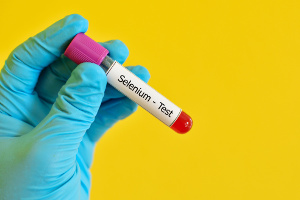Widespread selenium deficiency among cancer patients worsens their prognosis
 Newly diagnosed cancer patients often lack selenium. Not only does this contribute to the development of the disease, but it also worsens the prognosis. An estimated one billion people worldwide are selenium-deficient and there are many things that can explain it. High-doses selenium supplementation of cancer patients seems to have a positive effect on their health and quality of life during rehabilitation, and the best effect is seen when blood selenium levels remain high, according to a German study published in Nutrients.
Newly diagnosed cancer patients often lack selenium. Not only does this contribute to the development of the disease, but it also worsens the prognosis. An estimated one billion people worldwide are selenium-deficient and there are many things that can explain it. High-doses selenium supplementation of cancer patients seems to have a positive effect on their health and quality of life during rehabilitation, and the best effect is seen when blood selenium levels remain high, according to a German study published in Nutrients.
Rehabilitation is a process where patients regain their physical and mental health, which has been affected by the disease or by therapies. Cancer is considered a chronic disease, which means the patients can benefit from rehabilitation before, during, and after treatment. Many cancer patients suffer unwanted weight loss, even before being diagnosed, and that is a sign of malnourishment. In addition, the cancer treatment itself can cause side effects such as reduced appetite, nausea, vomiting, pain, and digestive problems that lead to reduced food intake. Metabolic disturbances can also lead to cancer-related malnourishment.
It also appears that being malnourished at the time of the diagnosis impairs the prognosis, and that a 5-10 percent weight loss in connection with radiation therapy negatively affects five-year survival.
One in three cancer patients is malnourished and that includes both the energy-containing macronutrients (fat, carbohydrate, and protein) and micronutrients (vitamins and minerals), a problem that is referred to as hidden hunger. Technically, cancer patients can lack essential micronutrients even with an adequate energy intake.
An estimated one billion people worldwide are believed to lack selenium – especially due to factors like nutrient-depleted farmland, wrong diets, and ageing.
Selenium is important for our metabolism, energy turnover, immune defense, and as an antioxidant that protects our cells against oxidative stress caused by free radicals. For years, science has had its focus on the fact that selenium deficiency leaves cells vulnerable and contributes to various types of cancer.
Zinc deficiency is also quite common. This mineral supports hundreds of different enzyme reactions and is also an important antioxidant that protects cells.
The purpose of the German study was to study the prevalence of selenium and zinc deficiency in cancer patients in the beginning of their rehabilitation and to see if supplements can optimize blood levels of the minerals and improve quality of life.
High-dosed selenium supplements work best in those with deficiency
The German study was a so-called observational study of 271 patients suffering from different cancer forms (breast cancer, colon cancer, and pancreas cancer). The scientists collected and analyzed data from HRQOL-questionnaires (Health-Related Quality of Life) that included details about quality of life before and up to three months after rehabilitation. On the exact same three occasions, patients had their blood levels of selenium and zinc analyzed by means of whole blood analyses that are far more accurate. Contrary to serum analyses, whole blood analyses also reveal cellular content of the two minerals.
Selenium deficiency was widespread (34-90 percent of the cancer patients lacked selenium), and the deficiency was most pronounced in the pancreas. Zinc deficiency was less common.
Selenium-deficient study participants were given high-dosed selenium supplements in the range of 300-600 micrograms per day, where 600 micrograms turned out to be more effective for optimizing blood levels of selenium.
High-dosed selenium supplementation also turned out to have a positive effect on quality of life in general, energy levels, and physical and mental capacity. In contrast, impairments of the same parameters were observed when blood selenium dropped.
Based on this, the scientists concluded that selenium deficiency is common among cancer patients before and after rehabilitation. Selenium supplements can correct these deficiencies and improve quality of life in many ways. Moreover, the positive effect of selenium supplementation lasts longer if blood levels of selenium remain stable throughout the rehabilitation period.
Selenium recommendations and actual needs
According to the New Nordic nutrient recommendations (NNR-2023), the recommended daily selenium intake for men has increased from 60 to 90 micrograms, while it has gone from 50 to 75 for women. Still, multiple studies suggest that most people require at least 100 micrograms daily to properly saturate selenoprotein P, which is used as a marker of the body’s selenium status.
Many studies of selenium have tested daily doses of 200 micrograms, and according to the European Food Safety Authority (EFSA), 300 micrograms per day is the safe upper intake limit. According to the new German study, however, one can conveniently administer large doses for a certain period of time if a person is selenium-deficient. Available research suggests that selenium yeast has the best effect because it contains a variety of different organic selenium species.
Widespread selenium deficiency and increasing cancer rates
Selenium supports around 25 different selenoproteins, including important enzymes and powerful antioxidants, some of which have different anti-cancer mechanisms. Selenium deficiency is particularly widespread in Europe, which was confirmed by the German study.
References:
Christina Pfister, Joerg Schoenemann. Selenium in Cancer Rehabilitation – A Retrospective Study from a Specialized Clinic. Nutrients 2023 Sep.
Nordic Council of Ministers. Nordic Nutrition Recommendations 2023
Clark LC et al: Effects of Selenium Supplementation for Cancer Prevention in Patients with Carcinoma of the Skin. JAMA: 1997.
TIP! See also the related articles
Search for more information...
- Created on .








